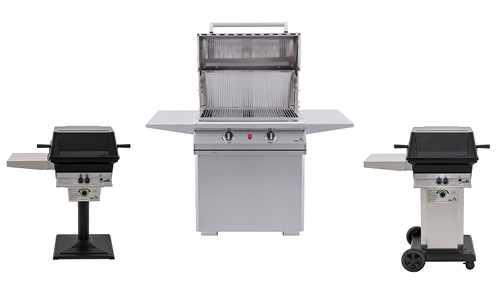Compare Natural Gas vs Propane vs Electric for Patio Grills
11 minute read
|
Grills
When it comes to choosing a patio grill, the fuel type you select can significantly impact your experience in terms of convenience, installation, portability, and compliance with building codes. For contractors, developers, and property owners—especially those managing multi-family units like apartments or condos—it’s essential to understand the differences between natural gas, propane, and electric grills. In this post, we’ll break down the pros and cons of each option to help you make an informed decision for your property. Natural gas grills are a popular choice due to their reliability and ease of use. Since they connect directly to your home's natural gas line, you never have to worry about running out of fuel or refilling tanks. Once installed, they provide a continuous supply of gas, making them very convenient. However, one major downside is that natural gas grills are not portable—they stay in one place once set up. Propane grills are known for their portability. The fuel is stored in a tank that connects to the grill, allowing you to move it around as needed. This makes them ideal for properties where storage space is limited or when you want to grill in areas without access to natural gas or electricity. The only drawback is that you’ll need to refill the tank periodically. But with a few spare tanks on hand, this minor inconvenience becomes manageable. Electric grills are gaining popularity, especially in cities with strict regulations on gas and propane appliances. They plug into a NEMA 6-30 outlet, similar to what you’d use for a washer or dryer. While this means they aren’t portable, they offer an eco-friendly alternative, particularly if your city uses renewable energy sources. Our electric model is made from stainless steel, which makes it resistant to rust and corrosion, ensuring long-term durability. Natural Gas Grills: Great for common areas in multi-family buildings. Their continuous fuel supply makes them perfect for frequent use without worrying about fuel levels. Propane Grills: Ideal for properties needing flexibility. Their portability allows storage when not in use and movement to different locations, making them suitable for smaller spaces or areas without gas or power access. Electric Grills: Increasingly necessary due to regulations. They’re a sustainable choice and fit well with modern building codes. Our stainless steel electric grill is durable and built to last, making it a smart investment for any property. Natural Gas Grills: We offer a variety of cast-aluminum and stainless steel models designed for easy installation and long-term use. Perfect for permanent setups where convenience is key. Propane Grills: Available in multiple styles, these models are ideal for properties that value mobility and flexibility. From backyard gatherings to event setups, they deliver great performance wherever you take them. Electric Grills: Our new electric grill is made from stainless steel, offering a durable and eco-friendly solution. It fits the same dimensions as our S27T commercial model, making it a seamless addition to custom outdoor kitchens. Choosing the right patio grill depends on your property’s specific needs, including convenience, budget, and environmental goals. Whether you go with natural gas, propane, or electric, each option has its advantages. If you're looking for guidance or more details about our products, feel free to reach out. We’re here to help you find the best solution for your space! Want more information? Have a question? Contact us today, and we will be happy to help! Glue Products,Adhesive Remover,Tacky Glue,Metal Glue KRONYO United Co., Ltd. , https://www.kronyotirerepairkit.comCompare Natural Gas vs Propane vs Electric for Patio Grills

Understanding the Different Fuel Types for Outdoor Patio Grills
Natural Gas Patio Grills
Portable Propane Patio Grills
Electric Patio Grills
Detailed Comparison of Fuel Types
Convenience and Installation
Eco-Friendliness
Cost Considerations
Practical Applications for Multi-Family Properties
Our Product Offerings
Making the Right Choice
Factors to Consider
Recommendations
